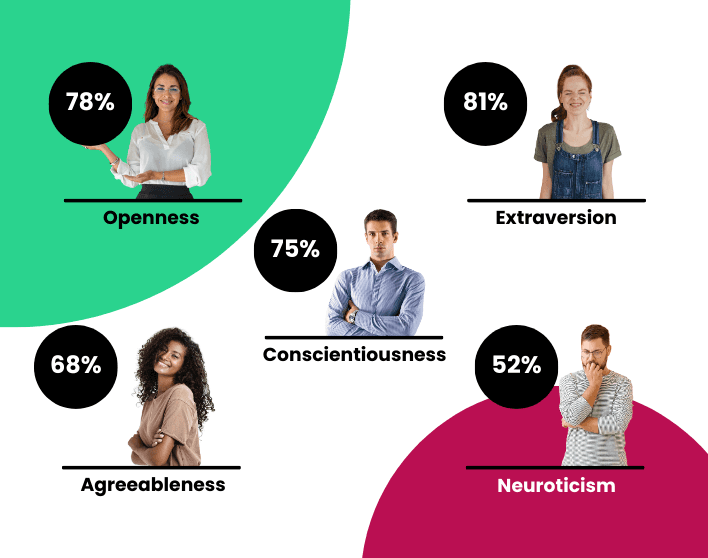The Bryq Team
HR Experts
Job fit is a crucial component of finding the right type of person for the position you have currently available. If the person is the right fit for the role, they are more likely to flourish in that position and go on to be extremely productive at work. That’s why testing for job fit during the interview phase of the recruitment process is so crucial.
What is Job Fit?
Job fit refers to how well a candidate’s skills and abilities fit the role available. It seeks to match up the job’s requirements with the experience, qualifications, and personality of the candidate to determine whether the applicant is a good match. Also, it can measure whether a person is likely to be productive, how well they may form relationships, and more. These are essential aspects of doing well in any job.
Job fit looks far past just skills and knowledge and also considers personality traits such as assertiveness and trustworthiness. These are also suitable predictors of how well a person may perform in a role.The challenge when it comes to job fit is accurately assessing it. You need correct information about the candidates and have relevant, well-defined job criteria before you can determine job fit.
Benefits of Hiring for Job Fit
Before you hire someone, you need to ensure that they are able to complete the tasks of the role you are hiring for. As mentioned, however, job fit is far more in-depth than just finding someone with the right skills.
Job fit can predict how engaged the candidate could be in their new role, their job satisfaction, and how productive they may be. That’s why many hiring managers and recruiters prefer to test for job fit during the interview process – they want an employee who will be happy at work and therefore stay in the role for a long time. Decrease turnover by hiring the right people for your team and boost morale by hiring someone who creates good relationships with others.
How to Test for Job Fit in Interviews
Customize Your Questions
Each position you fill will require different things of the successful applicant. So, equally, your interview questions for each recruitment process should be different. If you want to determine job fit, you need questions that are specifically searching for the traits and abilities you want in a candidate. That means that no two sets of job interview questions for different positions will be the same as each position will require slightly different talents.
Don’t Forget Soft Skills
When you are developing your set of interview questions, don’t forget to include some around soft skills and personality traits. These are just as important to job fit as technical abilities and experience. The soft skills you are looking for will depend on the role in question. Some positions require the candidate to be able to handle conflict well, build relationships, communicate effectively, or other traits. Try adding questions such as:
‘Tell us about a time when you had to resolve a conflict with a colleague. What happened, and how did you go about it?’
What you can learn from this is how the person handles it when they disagree or don’t get along with others. You will find out about a time this has happened in the past and how they dealt with it. Hopefully, even if they didn’t manage it that well, they can share their learnings from this with you.
‘How would you let your team know that your organization is undergoing a massive restructuring process where some people may lose their jobs?’
By asking this question, you are diving deeper into the applicant’s communication and interpersonal skills. Knowing how someone gives bad news can give you a lot of insight into how good the job fit is.
‘How do you go about building relationships with people across your organization?’
This question is relatively direct, but you will discover how the person achieves a goal and how good they are at relationship building. If building relationships is essential for job fit and they say that they don’t really put effort into it usually, this may be a red flag for you.
Consider the Role Level
If someone meets your job-fit criteria but perhaps doesn’t have all of the technical skills you require, it’s not the end of the world. Hiring based on job fit and then training the person up to meet your other requirements can be a great way to go about it for those early in career positions. However, as you move higher up the corporate ladder, people tend to become more set in their ways and may have difficulty learning new ways of doing things. For higher-level positions, you may need to rely less on training and more on finding someone with what you’re looking for.
Job Fit Test
If you want more quantifiable data on job fit, then you can always implement a job fit test into your recruitment process. The test will provide candidates with questions that relate to the abilities required for the role. At the end, you will get the data on how well each applicant meets the preferred criteria that you set. In addition to interviewing the applicants, this can help you to make a better hiring decision. Implement it before or after interviewing for best results. Many can be completed online, so you could send a link to the job fit test along with the interview confirmation.
Find a new employee who will fit in well in their new work environment by focusing on job fit during the interview process. If you can accurately assess job fit, then you can hire someone more productive who will be happier in the role. Avoid making a hiring mistake by prioritizing finding someone who will not just meet your essential criteria but flourish in their new role. By tweaking your interview questions, considering the level of the job, and seeking out candidates’ soft skills, you can be confident in finding the perfect person for your position.








